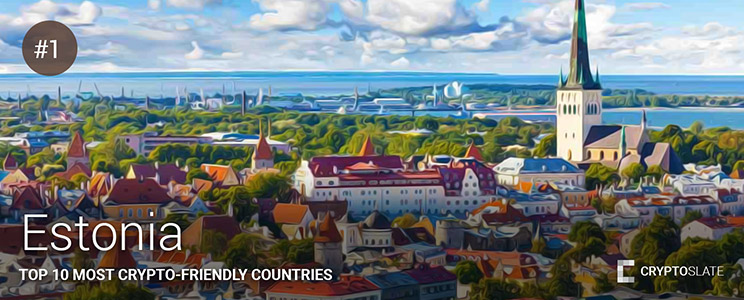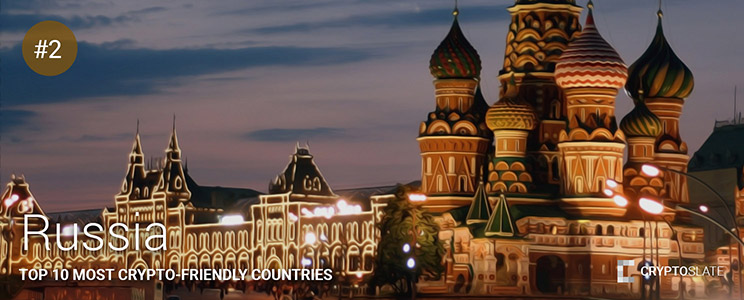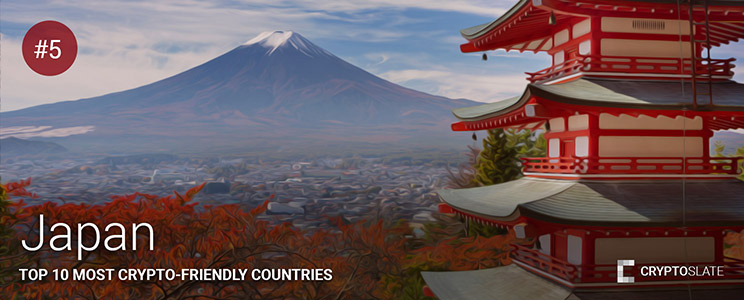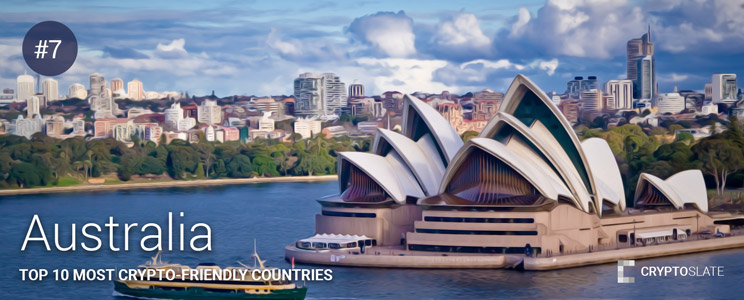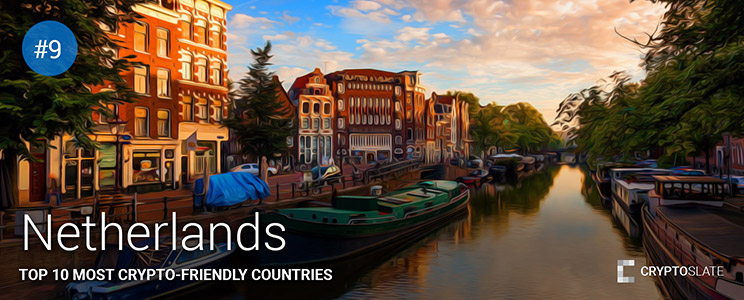 Top 10 Most Crypto-Friendly Countries
Top 10 Most Crypto-Friendly Countries Top 10 Most Crypto-Friendly Countries
Estonia becomes a pioneer in e-residency and blockchain integration for digital identity and healthcare services.

Cover art/illustration via CryptoSlate. Image includes combined content which may include AI-generated content.
Despite China’s ban on ICOs and its temporary halts on all cryptocurrency exchanges, many other countries are quickly taking advantage of the cryptocurrency potential.
While this list contains some of the usual tech-friendly countries like the United States and Russia, many new contenders have made the list to prove that they will be on the forefront of blockchain technology as well.
Estonia has been making strides to encourage blockchain technology to interweave with its economy and citizens. After becoming the first country in the world to establish e-residency, Estonia announced that it would become a leading country in blockchain innovation.
Digital identity and healthcare services have received a massive security boost through blockchain’s immutable ledger, which has led to a massive amount of healthcare-related blockchain ICOs.
The eHealth foundation of Estonia has become the first governmental practice to actually incorporate blockchain into their healthcare system. Currently, all medical records are being recorded and digitized into the blockchain developed by Estonia’s blockchain team.
Russia’s biggest lenders, including Sberbank and VTB Group, have created a new blockchain ledger called Masterchain, which will be used to help process transactions much faster through the central bank.
This isn’t the first news of blockchain and cryptocurrencies being used throughout Russia’s economy; Putin has been a long-time fan of Ethereum and the possibilities that arise in its blockchain.
“The digital economy isn’t a separate industry; it’s essentially the foundation for creating brand new business models,” Putin once told interviewers at an event. There is even a Russian airline that is using a blockchain ledger built off Ethereum that will record all of its ticket bookings.
Zug, Switzerland has become known as “Crypto Valley” after many major blockchain organizations have made headquarters in the area. Tezos, Ethereum, Shapeshift and many others have established themselves in Switzerland due to Switzerland’s openness and support for blockchain.
Switzerland has looser regulation laws for blockchain startups and is even implementing digital identities for Zug residents on the Ethereum blockchain. Six Securities is another major Swiss company that has been researching blockchain and how it can affect major businesses and government in a global perspective.
Gibraltar, a British overseas territory at the southern tip of Spain, has recently launched itself into the blockchain revolution. Gibraltar is even launching a blockchain summit, which will discuss the future of regulations for ICOs and blockchain technologies.
Gibraltar was the first country to set up regulatory framework for blockchain technology back in May, encouraging a safe environment for both developers and investors.
The chief executive of the Gibraltar Financial Services Commission, Samantha Barrass said:
“The proposed framework will facilitate a progressive, well-regulated and safe environment for firms using DLT [Distributed Ledger Technology] to grow, while also ensuring that this new regulatory environment protects both consumers and the good reputation of the jurisdiction.”
Investors are already running to set up in Gibraltar, knowing that the government will always support blockchain-based ventures.
Although it is only recently that Japan has become crypto-crazy, Japan has already caught up to most other countries, introducing blockchain to many governmental sectors.
This includes tracking some governmental tenders through March 2018. Another big move will be their plan to unify all land and property registries throughout the country under one blockchain ledger.
Private sectors of Japan seem to be down with blockchain as well: Yoshikawa, Ripple’s director of joint ventures, says that she expects 40% of Japanese banks to be among the many worldwide to begin cross-border payments using Google-backed Ripple’s blockchain platform.
This small island deep in the Indian Ocean has big plans to become “Ethereum Island.” Founders of ConsenSys are forming a partnership with the country to establish blockchain principles throughout the island’s ecosystem.
They would implement digital identity and decentralized information. Free wifi would also be accessible throughout the whole island. ConsenSys believes this experiment will boost the nation’s revenue and economy, as well as launch Mauritius as a leader in the blockchain industry.
Although Australia has been known to have some harsher rules on regulating crypto, this doesn’t stop its citizens from becoming obsessed.
In 2016, Australia removed its “double taxation” on Bitcoin and other altcoins, officially considering it all as currencies. Parliament is beginning to understand the implications of blockchain and Bitcoin and has recently formed the “Parliamentary Friends of Blockchain” group.
This allows senators and governmental members to interact and ask about all things blockchain and cryptocurrency, to keep Australia’s government up to date on movements. Australia has recently planned to regulate digital currencies, but this regulation is happening globally and means that crypto is being acknowledged as an important player in the economy.
One Friday in late August, South Korea contributed to 70% of Ripple’s price jump, bringing in a whopping 7% of the entire Bitcoin volume traded that day. South Korea is waking up to Bitcoin in a big way recently, introducing FinTech roadmaps for regulations and investing in research projects from the Central Bank to Bitcoin.
South Korea regularly hosts bitcoin conferences and is set to make Bitcoin a real part of their economy.
The Dutch have been ahead of the blockchain game, researching within the government since 2013. Now, we see many Dutch banks experimenting with blockchain based transactions.
The Ministry of Economic Affairs has revealed a roadmap for the National Blockchain Coalition in 2017 as well to continue to this agenda of blockchain research.
Arnhem boasts hundreds of vendors who accept Bitcoin, competing with Zug to become the first “Bitcoin City,” which is sure to attract Bitcoin believers around the world.
“The Future is Here” was a report from Singapore’s central bank stating that they have successfully digitized the Singapore dollar (SGD) onto an Ethereum-based private blockchain.
Although it is still in trial, this is the first real step towards blockchain and interbank payments.
Many ICOs and blockchain concepts are being produced in Singapore, including TenX. TenX is the first working concept of a bitcoin debit card that automatically converts bitcoin to the local currency on a swipe of the card.
Singapore has named itself a FinTech revolutionary for years, so there is no surprise that the country is making strides in blockchain technology.
Conclusion
When diverse nations act in support of an innovation such as blockchain technology and cryptocurrency, it should give you, the investor, greater confidence in taking risks. As knowledge and understanding of the crytocurrency market increases globally, other nations will inevitably follow suit. History is in the making as we speak!
































































































